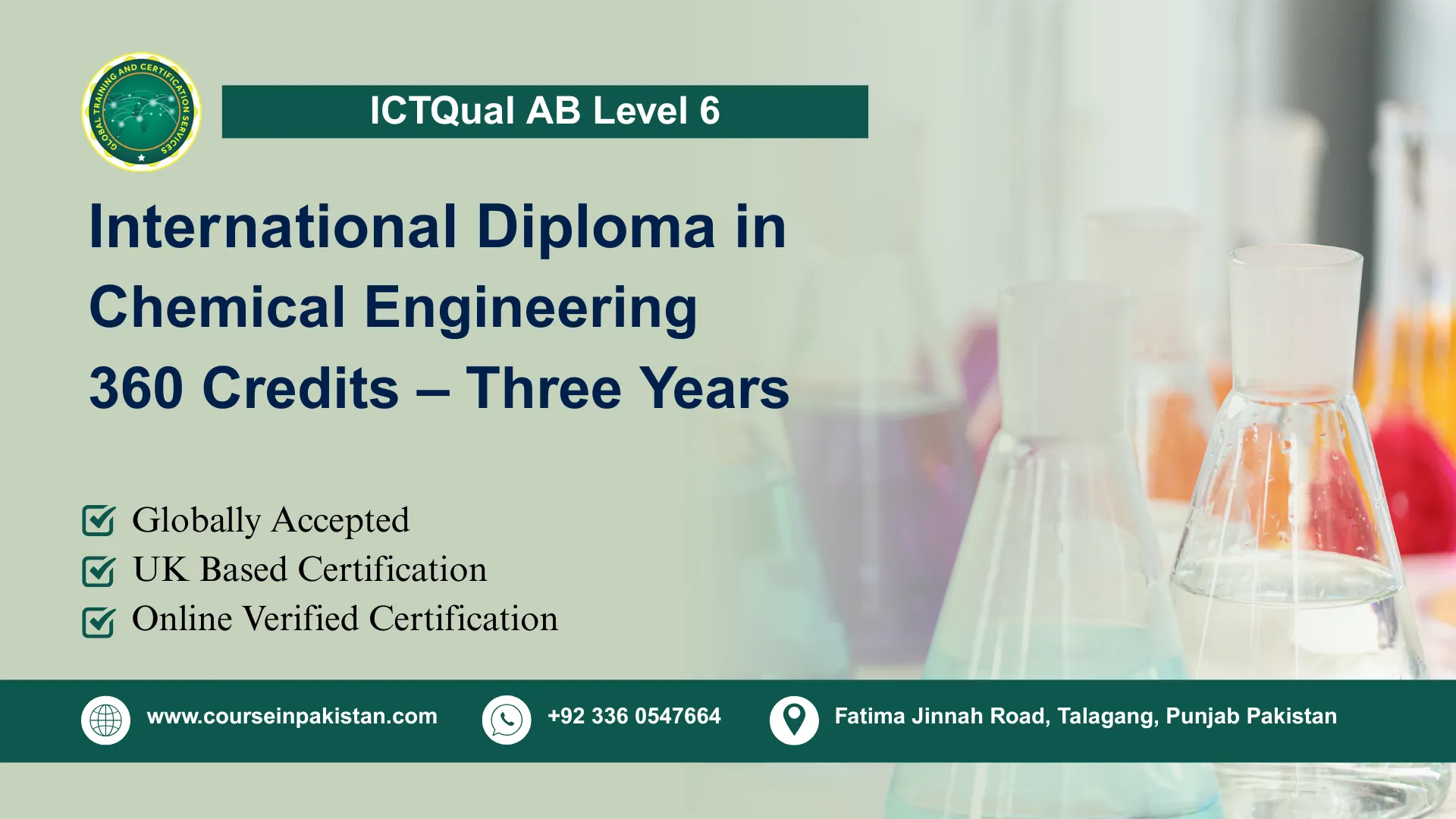
The ICTQual Level 6 Diploma in Chemical Engineering 360 Credits – Three Years is a comprehensive, internationally recognized program designed to provide learners with advanced knowledge and practical skills in chemical engineering. This three-year, 360-credit qualification covers foundational, intermediate, and advanced aspects of chemical engineering, including process design, chemical reactions, material science, industrial processes, safety protocols, and sustainable technologies.
This certification is entirely assignment-based, allowing learners to study at their own pace from anywhere in the world. Fresh learners can complete all 36 mandatory assignments within three years, while experienced professionals with at least six years of verifiable experience can achieve certification faster by demonstrating their expertise in professional discussions with an ICTQual AB Approved assessor. The program is British Council verifiable, MOFA and Embassy attested, making it highly suitable for job applications and iqama approvals in multiple countries.
Course Overview
The ICTQual Level 6 Diploma equips learners with the technical knowledge, problem-solving skills, and professional competence required to excel industries. From process design, thermodynamics, and reaction engineering to industrial operations, environmental safety, and innovation in chemical processes, the curriculum ensures that learners gain a complete understanding of the field. This flexible, globally recognized qualification is ideal for both fresh candidates seeking a solid foundation in chemical engineering and experienced professionals aiming to fast-track certification and career advancement. The course ensures that graduates are ready to meet industry standards and regulatory requirements in chemical engineering worldwide.
Key Highlights of the Course:
- Fully assignment-based program allowing self-paced study from anywhere in the world.
- 360 credits covering foundational to advanced chemical engineering topics.
- British Council verifiable, MOFA and Embassy attested for global recognition and job applicability.
- Suitable for fresh learners and experienced professionals with flexible certification pathways.
- Focus on industrial applications, safety standards, sustainability, and innovative chemical technologies.
Course Benefits
Professional Competence
- Gain expertise principles and industrial applications.
- Develop critical skills in process design, material science, and reaction engineering.
- Learn safety protocols, quality assurance, and environmental management in chemical industries.
Career Advancement
- Enhance employability in chemical, petrochemical, pharmaceutical, and manufacturing industries.
- Eligibility for international job opportunities and iqama approvals.
- Fast-track certification option for experienced professionals with proven expertise.
Practical Knowledge
- Hands-on understanding of industrial processes, instrumentation, and chemical operations.
- Exposure to sustainable technologies, process optimization, and emerging innovations.
- Preparation for project management and leadership roles in chemical engineering projects.
Global Recognition
- British Council verifiable certification ensures credibility and international acceptance.
- MOFA and Embassy attested, suitable for global professional and academic pursuits.
Course Study Units
This qualification, the ICTQual Level 6 Diploma in Chemical Engineering 360 Credits – Three Years, consists of 36 mandatory units.
Year 1: Foundation of Chemical Engineering
- Introduction to Chemical Engineering
- Basic Thermodynamics
- Mathematics for Chemical Engineers
- Fluid Mechanics
- Material and Energy Balances
- Introduction to Process Control
- Chemistry for Chemical Engineers
- Introduction to Reaction Engineering
- Engineering Drawing and CAD
- Professional Skills Development
- Heat and Mass Transfer Fundamentals
- Chemical Engineering Principles
Year 2: Advanced Chemical Engineering Concepts
- Advanced Thermodynamics
- Heat Transfer
- Mass Transfer Operations
- Chemical Process Design
- Industrial Chemistry
- Process Systems Engineering
- Fluid Dynamics and Flow Systems
- Reaction Engineering
- Environmental Engineering
- Process Control and Automation
- Process Modeling and Simulation
- Engineering Materials
Year 3: Specialization and Industry Application
- Advanced Process Control
- Process Safety and Risk Management
- Chemical Plant Design
- Sustainable Chemical Engineering
- Separation Technology
- Computational Fluid Dynamics (CFD)
- Advanced Materials Science
- Process Optimization
- Industrial Placement / Internship
- Capstone Project
- Project Management for Chemical Engineers
- Biochemical Engineering
Learning Outcomes
Year 1: Foundation of Chemical Engineering
Introduction to Chemical Engineering
- Understand the fundamentals and scope of chemical engineering.
- Identify key roles, responsibilities, and career paths in the chemical engineering field.
Basic Thermodynamics
- Explain the principles of energy, work, and heat in chemical processes.
- Apply thermodynamic laws to simple chemical engineering systems.
Mathematics for Chemical Engineers
- Solve engineering problems using calculus, algebra, and differential equations.
- Apply mathematical models to chemical engineering applications.
Fluid Mechanics
- Understand fluid properties, behavior, and flow principles.
- Analyze fluid flow in pipelines, pumps, and reactors.
Material and Energy Balances
- Perform mass and energy balance calculations for chemical processes.
- Apply conservation laws to process systems.
Introduction to Process Control
- Understand the basics of process measurement and control.
- Apply control principles to simple chemical engineering operations.
Chemistry for Chemical Engineers
- Apply chemical principles to engineering problems.
- Understand chemical reactions, kinetics, and material properties.
Introduction to Reaction Engineering
- Understand fundamental reaction kinetics and reactor types.
- Apply basic calculations to design simple chemical reactors.
Engineering Drawing and CAD
- Develop engineering diagrams and technical drawings.
- Use CAD tools for process and equipment design.
Professional Skills Development
- Develop communication, teamwork, and professional ethics.
- Apply workplace skills relevant to chemical engineering contexts.
Heat and Mass Transfer Fundamentals
- Understand conduction, convection, and diffusion principles.
- Apply heat and mass transfer calculations to engineering systems.
Chemical Engineering Principles
- Integrate core principles of chemical engineering in process analysis.
- Solve practical engineering problems using foundational concepts.
Year 2: Advanced Chemical Engineering Concepts
Advanced Thermodynamics
- Apply thermodynamic principles to complex chemical processes.
- Analyze energy efficiency and process optimization.
Heat Transfer
- Design and evaluate heat exchangers and thermal systems.
- Apply principles to energy conservation in chemical plants.
Mass Transfer Operations
- Understand separation processes such as distillation and absorption.
- Analyze and design mass transfer equipment.
Chemical Process Design
- Develop chemical process flow diagrams and design calculations.
- Evaluate the feasibility and safety of chemical processes.
Industrial Chemistry
- Understand industrial chemical reactions and processes.
- Apply chemical principles to manufacturing systems.
Process Systems Engineering
- Model and simulate process systems for efficiency.
- Optimize process operations using system-based approaches.
Fluid Dynamics and Flow Systems
- Analyze complex fluid flow systems in industrial applications.
- Solve problems involving laminar and turbulent flow.
Reaction Engineering
- Design reactors for batch and continuous processes.
- Optimize reaction conditions for maximum yield.
Environmental Engineering
- Implement sustainable practices in chemical engineering processes.
- Assess environmental impact and compliance with regulations.
Process Control and Automation
- Apply automated control systems in industrial plants.
- Monitor and optimize process variables for safety and efficiency.
Process Modeling and Simulation
- Use simulation software to predict process behavior.
- Analyze system performance under different operating conditions.
Engineering Materials
- Evaluate material properties for chemical process applications.
- Select appropriate materials for equipment design and safety.
Year 3: Specialization and Industry Application
Advanced Process Control
- Implement advanced control strategies in chemical plants.
- Optimize operations for stability and efficiency.
Process Safety and Risk Management
- Identify hazards and implement risk mitigation strategies.
- Apply safety regulations in chemical engineering environments.
Chemical Plant Design
- Plan and design chemical plant layouts and equipment.
- Integrate economic and safety considerations into design.
Sustainable Chemical Engineering
- Apply sustainable and green engineering principles.
- Reduce environmental impact in industrial processes.
Separation Technology
- Design and optimize separation equipment like distillation columns.
- Analyze separation efficiency and process economics.
Computational Fluid Dynamics (CFD)
- Model fluid flow and heat/mass transfer using CFD software.
- Interpret simulation results for process improvement.
Advanced Materials Science
- Evaluate materials for chemical engineering applications.
- Apply knowledge of polymers, composites, and corrosion-resistant materials.
Process Optimization
- Use quantitative methods to improve process efficiency.
- Implement cost and resource optimization strategies.
Industrial Placement / Internship
- Apply theoretical knowledge in real-world industrial settings.
- Develop professional skills and industry awareness.
Capstone Project
- Integrate knowledge from all previous units to solve complex problems.
- Produce a professional report and presentation of the project outcomes.
Project Management for Chemical Engineers
- Plan, execute, and monitor chemical engineering projects.
- Apply project management tools to achieve objectives on time and budget.
Biochemical Engineering
- Understand principles of bioprocesses and bioreactor design.
- Apply biochemical engineering concepts in industrial applications.
Who is This Course For?
Fresh Graduates
- Students who have completed high school or a relevant Level 5 qualification.
- Individuals seeking foundational knowledge in chemical engineering.
- Learners aiming to build a career in chemical, petrochemical, or pharmaceutical industries.
Experienced Professionals
- Chemical engineers or technologists with 6+ years of verifiable experience.
- Professionals seeking formal recognition of their skills and faster certification.
- Individuals looking to enhance leadership or technical roles in chemical engineering projects.
Career-Oriented Learners
- Those aiming for international job opportunities in industrial, manufacturing, or process engineering sectors.
- Individuals preparing for professional certifications, iqama approval, or industry compliance requirements.
Future Progression
- Eligibility for advanced professional or academic roles in chemical engineering and related fields.
- Opportunities to pursue higher studies such as Master’s or Postgraduate Diplomas in Chemical, Process, or Industrial Engineering.
- Leadership and management positions in chemical manufacturing, pharmaceuticals, or environmental industries.
- International career prospects due to MOFA, Embassy attestation, and British Council verification.
- Potential to become project managers, process engineers, or research specialists in chemical engineering sectors.
Academic Pathways:
- Progression to Level 7 Diplomas or Postgraduate Certificates in Chemical or Process Engineering.
- Entry into Master’s degree programs in Engineering, Industrial Management, or Environmental Technology.
- Pathways to certifications in Safety, Quality, and Process Management for chemical industries.
- Professional development courses in Sustainable Engineering and Innovation.
Conclusion
The ICTQual Level 6 Diploma in Chemical Engineering is an internationally recognized, flexible qualification designed to equip learners with advanced technical knowledge, practical skills, and professional competence in chemical engineering. Whether you are a fresh graduate or an experienced professional, this program provides a structured pathway to excel in chemical, petrochemical, pharmaceutical, and industrial sectors. With 360 credits, full assignment-based flexibility, and global verification and attestation, learners gain both academic and career advantages while being prepared to meet international industry standards.






